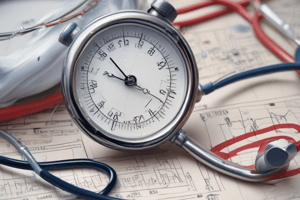Podcast
Questions and Answers
What do vital signs help assess?
What do vital signs help assess?
- Muscle strength, bone density, joint flexibility
- Nutritional status, hydration level, sleep quality
- General physical health, possible diseases, recovery progress (correct)
- Mental health, emotional well-being, cognitive function
What are the four primary vital signs?
What are the four primary vital signs?
- Body temperature, blood pressure, oxygen level, pulse
- Body temperature, heart rate, respiratory rate, oxygen saturation
- Body temperature, blood pressure, pulse, breathing rate (correct)
- Blood sugar level, cholesterol level, body mass index, heart rate
What are vital signs often notated as?
What are vital signs often notated as?
- BT, BP, HR, RR (correct)
- Pulse, BP, RR, BS
- Temp, Gluc, O2, BMI
- HR, SpO2, RR, BMI
What have been proposed to combine the individual values of vital signs into a single score?
What have been proposed to combine the individual values of vital signs into a single score?
What may the vital signs include in addition to the four primary signs?
What may the vital signs include in addition to the four primary signs?
Flashcards
Vital signs purpose
Vital signs purpose
Assess general health, potential illnesses, and recovery progress.
Primary vital signs
Primary vital signs
Body temperature, blood pressure, pulse, and breathing rate.
Vital sign abbreviations
Vital sign abbreviations
BT (Body Temperature), BP (Blood Pressure), HR (Heart Rate), RR (Respiratory Rate).
Early warning scores
Early warning scores
Signup and view all the flashcards
Additional vital signs
Additional vital signs
Signup and view all the flashcards
Study Notes
Vital Signs
- Vital signs help assess a patient's overall health and detect any potential health problems.
- The four primary vital signs are:
- Pulse (heart rate)
- Blood pressure
- Respiratory rate (breathing rate)
- Body temperature
- Vital signs are often notated as:
- T (temperature)
- P (pulse or heart rate)
- R (respiratory rate)
- BP (blood pressure)
- Proposed methods to combine the individual values of vital signs into a single score include:
- APACHE (Acute Physiology and Chronic Health Evaluation) score
- Glasgow Coma Scale (GCS)
- SIRS (Systemic Inflammatory Response Syndrome) criteria
Additional Vital Signs
- In addition to the four primary signs, vital signs may also include:
- Pain (especially in patients who are conscious)
- Oxygen saturation (e.g., SpO2)
- Blood glucose level (especially in diabetic patients)
Studying That Suits You
Use AI to generate personalized quizzes and flashcards to suit your learning preferences.



